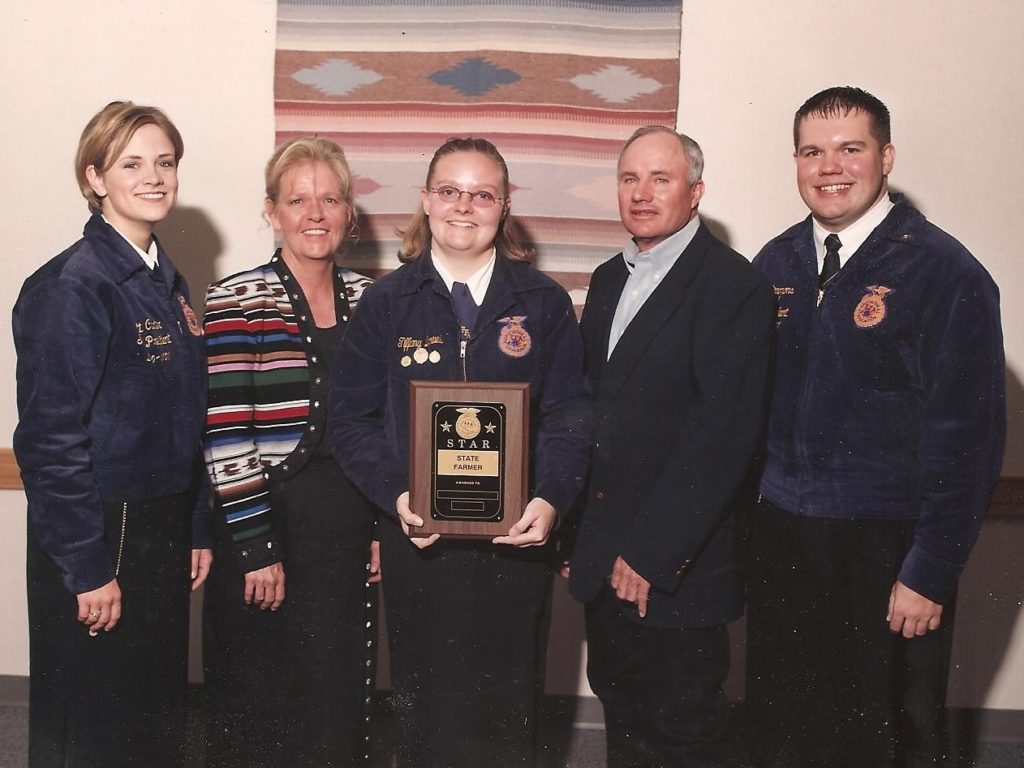Happy Friday and happy FFA week! I, like many of you, credit FFA for so much of my success in my life and career. I hope you take a moment to think back on what FFA has given you and think about ways you might be able to give back to the organization.

This was me, being named New Mexico State Star Farmer in 2001.
I also want to say a special welcome to those of you who are joining us after attending the Central Texas Farm Credit diner in Haskell this week. It was an honor to speak with you all and I want to welcome you to the Texas Ag Law Blog.
Here are some ag law stories in the news over the past couple of weeks.
*SCOTUS will hear Hawaii Wildlife Fund v. County of Maui case involving indirect discharges into groundwater. In what some are calling the biggest environmental case before the US Supreme Court this year, the Justices have granted cert in in the Maui case to address the issue of whether an indirect discharge, such as one made into groundwater the eventually reaches a jurisdictional water, is regulated under the Clean Water Act. [Read article here.] To read more about this issue and the cases that led to a split among the federal circuit courts, click here.
*Comment period now open for new proposed WOTUS definition. On Valentine’s Day, the EPA and US Army Corps of Engineers published the new proposed WOTUS definition in the Federal Register. [Read published rule here.] That opened up a 60-day comment period during which anyone can comment on the published definition. After that period has closed in April, the EPA and COE will take the comments under consideration, make any revisions they deem necessary, and publish a final rule. For more information on the WOTUS rule, including a discussion of the differences between the 2015 rule and this new rule, click here to listen to my podcast episode with Jim Bradbury. Also, if you are interested in making a comment, the Maryland Risk Management Education Blog has compiled a list of the various ways to do that, which you may access here.
* Leon County judge rules that proposed Bullet Train is not “railroad” and, therefore, lacks eminent domain power. Last week, a Leon County judge ruled that Texas Central, the company planning to build the high speed rail between Dallas and Houston did not qualify under Texas law as a “railroad” or an “interurban electric railway” and, as such, does not have the power of eminent domain for the high speed rail project. Texas Central has announced it intends to appeal this judge’s ruling, citing to a prior determination by the court in Harris County finding Texas Central to be a bona fide railroad company with condemnation power under Texas Transportation Code Sections 81.002 and 131.011. [Read article here.]
*Digital asset considerations when drafting estate plans. I read an interesting article by attorney Sam Moak from Huntsville recently talking about the various problems that can come up when someone passes away and did not provide consideration to how digital assets should be dealt with. From keeping a password list (in a secure location, of course) to backing up emails to social media accounts, there are a number of items to think about when drafting an estate plan these days. [Read article here.] Also, to see how this can be a major issue in the real world, check out this recent news article.

*Iowa will appeal “ag gag” ruling. You may recall from this prior blog post that an Iowa court recently struck down the state’s “ag gag” law as unconstitutional. [Read article here.]
*Class action lawsuit filed against Chipotle. My friend Paul Goeringer recently wrote a blog post discussing a class action lawsuit alleging that Chipotle’s advertising campaign that products were “non-GMO” and “GMO free” violated consumer protection laws in CA, MD, and NY. Plaintiffs argue the restaurant violated the law when they made such statements, but then served protein, cheese, and sour cream produced from animals t hat were raised on GMO feed and beverages made with GMO corn syrup. In September, the federal court granted class action status, certifying a class of all persons in CA, MD, or NY who purchased Chipotle’s food products containing meat or dairy ingredients between April 27, 2015 and June 30, 2016. The court has yet to consider the merits of the case, ruling only that the case would be allowed to proceed as a class action. [Read blog post here.]
*Death on the family farm. After a rough day back home last weekend, I wrote a little blog post about death on the family farm and the lessons that allows us to teach our children. [Read post here.]












